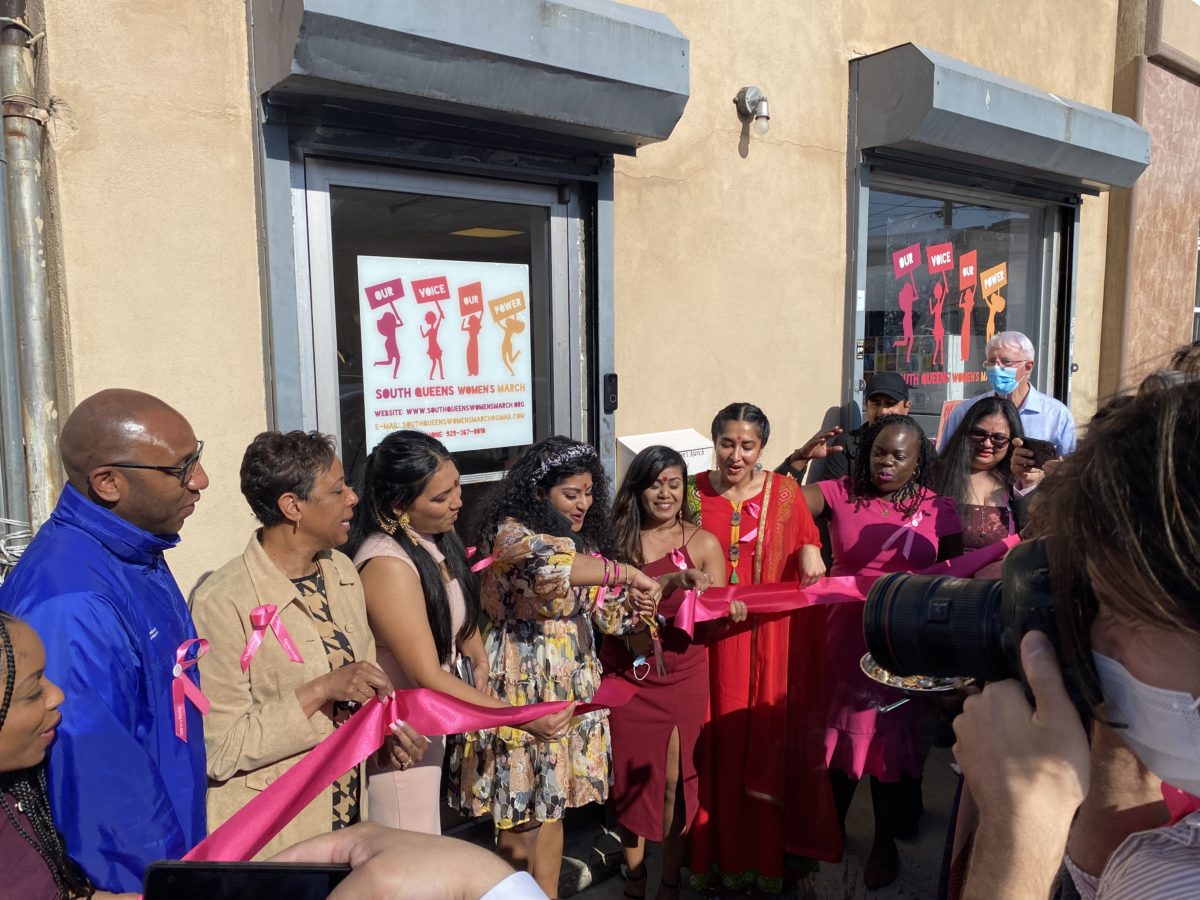SQWM celebrates new Richmond Hill office
South Queens Women’s March started out as an idea from founder and director Aminta Kilawan-Narine over two years ago, with the goal of promoting gender justice and empowering women, girls and gender-expansive people.
Although the pandemic prevented the original march from happening, it did not stop the organization from blooming into a movement that supports the diverse communities of South Queens.
Now, SQWM has a brand new office space on Liberty Avenue in Richmond Hill, and they held a ribbon cutting ceremony on April 16 to celebrate the milestone.
Many of SQWM’s 70 members attended the event, along with Council Speaker Adrienne Adams, Queens Borough President Donovan Richards, Councilwoman Selvena Brooks-Powers and NYS Assemblyman Khaleel Anderson.
“South Queens Women’s March has made enormous contributions to the civic and community life right here in Southeast Queens and right here in the Great 28,” Adams said.
“You have empowered and amplified the voices of diverse women across this borough, connected neighbors to important resources and advocated fiercely for gender and racial justice. Your work has been so critical, particularly during the COVID-19 pandemic, because of our own underserved conditions.”
 “It is so important to have community-based organizations at the forefront of these conversations, and South Queens Women’s March has been at the forefront of so many of these conversations,” Richards said.
“It is so important to have community-based organizations at the forefront of these conversations, and South Queens Women’s March has been at the forefront of so many of these conversations,” Richards said.
“As gender-based violence reached a crisis level during this pandemic, for every one encounter we are seeing 20 that go unreported,” he continued. “I look forward to continuing to support the work of South Queens Women’s March.”
As part of their mission, SQWM has offered various programs and services to the community, including food pantries, political education, youth and professional development workshops and healing circles.
They actively seek to serve and empower historically underserved communities in South Queens, namely women, people of color and the LGBTQ community.
“A South Queens Women’s March space is a dream—a dream that the younger me wishes had growing up in South Queens. As a gender justice organization, it is critical to have a space that can be a home away from home for community members and the younger me,” Tannuja Rozario, founding board member of SQWM, said.
“Our space will be a resource hub, a safe space for survivors, a community centered space for monthly pantries, healing activities, and workshops and a space where we cultivate grassroots organizing to build a movement.”
At the event, light refreshments were provided by local businesses Tropical Isle Roti Shop, Little Guyana Pharmacy and Cafe, Shivram’s Bakery, Singh’s Roti Shop and the Shakti Mission.
 SQWM also extended its gratitude to Bob Lawrence and Annie Mohan of Cadwalader, Wickersham and Taft, LLP and the Aqualia International Foundation for their support.
SQWM also extended its gratitude to Bob Lawrence and Annie Mohan of Cadwalader, Wickersham and Taft, LLP and the Aqualia International Foundation for their support.
Performances were given by SQWM members, including Harmehar Kaur Kohli on guitar and Anjali Seegobin, Sabrina Mohammed and Sacha Sulaiman, who performed an intersectional dance routine.
To welcome SQWM’s new space to the neighborhood, Pratima Kushmani Doobay, an organizer within the faith-based circles of the Hindu community, initiated a goddess blessing before the ribbon cutting ceremony.
“In Hinduism, we often worship the goddess, and Shakti is the feminine energy, the power associated with the goddesses in Hindusim,” Kilawan-Narine said. “We’re a women’s group, and we wanted to make sure the space was blessed.”
“The most exciting part about all of this is the space being open to our members and to women and girls in our community who are looking for a safe space,” she continued. “When you walk in here, you feel that inclusion and the peace.”
Kilawan-Narine said that the efforts from SQWM are anything but glamorous, and certainly not something done for personal gain.
“We all do this for the love of the community. Not for personal gain, or for accolades and praise or for social media followers,” she said. “This isn’t charity work, it is solidarity work, and you see that in the way we treat people.”





